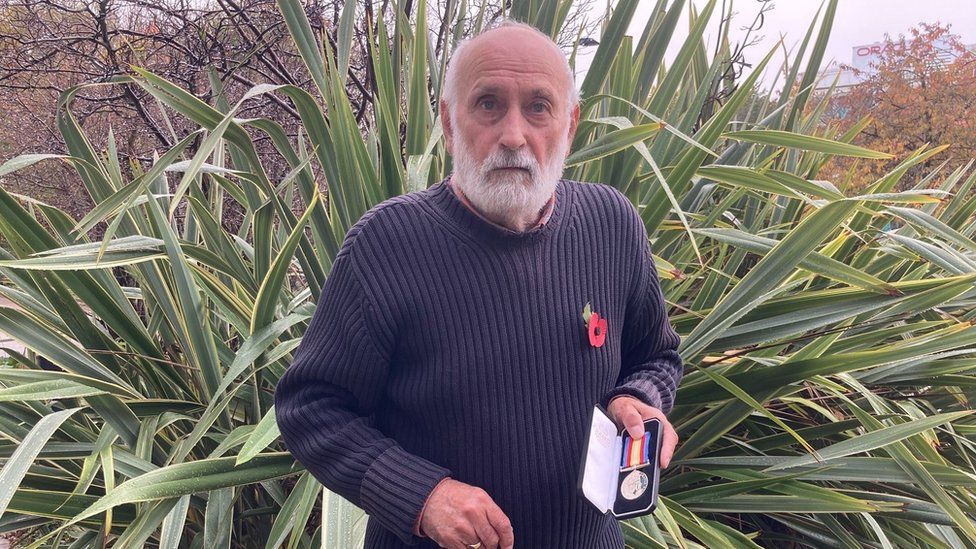RAF Christmas Island veteran, 85, receives nuclear testing medal
- Published

Roger Filby's silver medal features an atom surrounded by olive branches
An 85-year-old veteran has received a medal for his involvement in nuclear weapons testing on Christmas Island.
Roger Filby, who lives in Caversham, Reading, joined the RAF aged 18 and was part of Operation Grapple in 1957.
The Nuclear Test Medal has been released 70 years after the first test. Downing Street agreed to its creation after years of campaigning.
Mr Filby said: "We have done an awful lot for the country and we were entitled to be recognised."
Mr Filby (pictured left) was in the RAF signals and was part of Operation Grapple in 1957
Mr Filby explained that he was part of the ground signals in the RAF, communicating between departments.
"We weren't told anything about Christmas Island at all, or what we were going there for, or what sort of duties we were going to perform," he said.
He said it was only when there was an "influx" of bomber planes on the island that the ground personnel started to realised they wold be "working on something that was pretty important to the country."
"We were all pretty nervous when we realised it was nuclear."
Mr Filby recalled Christmas Island being "covered in palm trees, white sands and lines of tents"
He explained that none of them really knew "where the bombs were going to be exploded" and "we didn't know the size of the bombs".
He added: "We later learnt that the bombs were going to be exploded about one-and-a-half miles above sea level on the island of Malden, which was about 30 miles south of Christmas Island.
"We all expected massive waves to be washing over the island and we were all very concerned about that."
Mr Filby recalled feeling the blast before later hearing the explosion and seeing a "dreadful bloom" in the sky.
Mr Filby said he and his colleagues became nervous when they realised the test would be nuclear
He continued: "There was a bubbling of the sky - the red, the orange, the blue of the sky was turning that colour, and then later on there was the fading of the explosion and it was just a massive cloud that drifted across the island."
After seeing that, Mr Filby said no-one spoke much as "there wasn't a lot to say".
"I think I wrote home straight away and said this was dreadful," he said.
"It was something I didn't want to experience again but we had to - it was our duty."
Mr Filby said he was pleased to finally be recognised for his contribution
In November 2022, the government announced a medal for veterans and civilians who were involved in nuclear testing programmes.
The silver medal features an atom surrounded by olive branches and bears the words "Nuclear Test Medal" on one side, as well as an effigy of King Charles III.
Mr Filby said those involved in the testing had previously been denied the chance to march at the Cenotaph because of their lack of recognition.
had been denied the chance to march at the Cenotaph previously
"From that point onwards many of us thought 'no that can't be, we're entitled to it'," he said.
"We had done an awful lot for the country and we were entitled to be recognised."
Roger from Caversham was one of a small number of Brits involved in nuclear bomb tests.
Follow BBC South on Facebook, external, X, external, or Instagram, external. Send your story ideas to south.newsonline@bbc.co.uk.
Related Topics
- Published31 October 2023
- Published25 September 2023
- Published24 September 2023
- Published28 July 2023
- Published21 November 2022